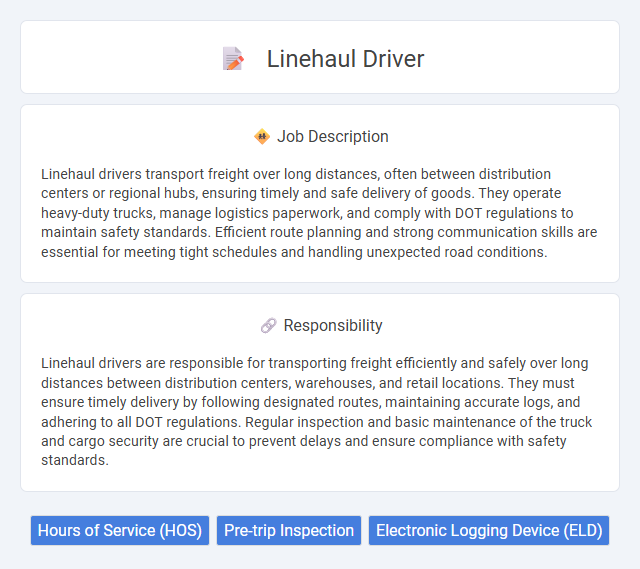
Linehaul drivers transport freight over long distances, often between distribution centers or regional hubs, ensuring timely and safe delivery of goods. They operate heavy-duty trucks, manage logistics paperwork, and comply with DOT regulations to maintain safety standards. Efficient route planning and strong communication skills are essential for meeting tight schedules and handling unexpected road conditions.
Individuals with physical stamina and the ability to endure long hours behind the wheel are likely suitable for a Linehaul driver job. Those prone to fatigue or difficulty managing isolation during extended trips may find the role challenging. It is probable that people who enjoy routine, driving, and working independently will adapt well to this occupation.
Qualification
Linehaul driver job qualifications typically include a valid commercial driver's license (CDL) with appropriate class and endorsements, a clean driving record, and experience with long-haul or regional freight transportation. Strong knowledge of federal and state transportation regulations, hours-of-service compliance, and vehicle inspection protocols is essential for safety and efficiency. Physical stamina and the ability to manage schedules, route planning, and cargo handling are critical skills for successful linehaul drivers.
Responsibility
Linehaul drivers are responsible for transporting freight efficiently and safely over long distances between distribution centers, warehouses, and retail locations. They must ensure timely delivery by following designated routes, maintaining accurate logs, and adhering to all DOT regulations. Regular inspection and basic maintenance of the truck and cargo security are crucial to prevent delays and ensure compliance with safety standards.
Benefit
Linehaul drivers probably experience significant financial benefits due to competitive salaries and overtime opportunities, enhancing overall earnings. Health and retirement benefits are likely included, providing essential security for long-term well-being. Employers may offer flexible scheduling and travel incentives, contributing to work-life balance and job satisfaction.
Challenge
Linehaul driver jobs likely present significant challenges due to extended hours on the road and strict delivery schedules. Navigating diverse traffic conditions and maintaining safety standards may require advanced driving skills and alertness. The role probably demands resilience and adaptability to handle unexpected delays and logistical issues.
Career Advancement
Linehaul driver positions offer substantial career advancement opportunities through experience and skill development in long-haul logistics and freight management. Drivers can progress to roles such as fleet supervisor, logistics coordinator, or operations manager by demonstrating reliability, route optimization skills, and safety compliance. Continuous training in transportation technologies and regulatory standards significantly enhances prospects for leadership and specialized driver roles within the supply chain industry.
Key Terms
Hours of Service (HOS)
Linehaul drivers must strictly adhere to Hours of Service (HOS) regulations set by the Federal Motor Carrier Safety Administration (FMCSA), which limit driving to 11 hours within a 14-hour workday and require 10 consecutive hours off-duty between shifts. The HOS rules also include a 30-minute break mandate after 8 cumulative hours of driving and a maximum 60 or 70-hour driving limit over 7 or 8 consecutive days depending on the carrier's schedule. Compliance with HOS regulations ensures driver safety, reduces fatigue-related accidents, and helps maintain operational efficiency across long-distance freight routes.
Pre-trip Inspection
A Linehaul driver's pre-trip inspection is critical for ensuring vehicle safety and regulatory compliance before long-distance hauls. This inspection includes checking tire pressure, brake functionality, lighting systems, fluid levels, and securing cargo to prevent accidents or delays. Thorough pre-trip inspections reduce mechanical failures and increase on-time delivery efficiency in the logistics industry.
Electronic Logging Device (ELD)
Linehaul drivers rely on Electronic Logging Devices (ELDs) to accurately record Hours of Service (HOS), ensuring compliance with Federal Motor Carrier Safety Administration (FMCSA) regulations. ELDs streamline duty status tracking, reduce paperwork, and enhance road safety by preventing driver fatigue through precise monitoring. Integration of ELD technology improves route efficiency and aids in real-time communication between drivers and dispatchers for better scheduling.
 kuljobs.com
kuljobs.com